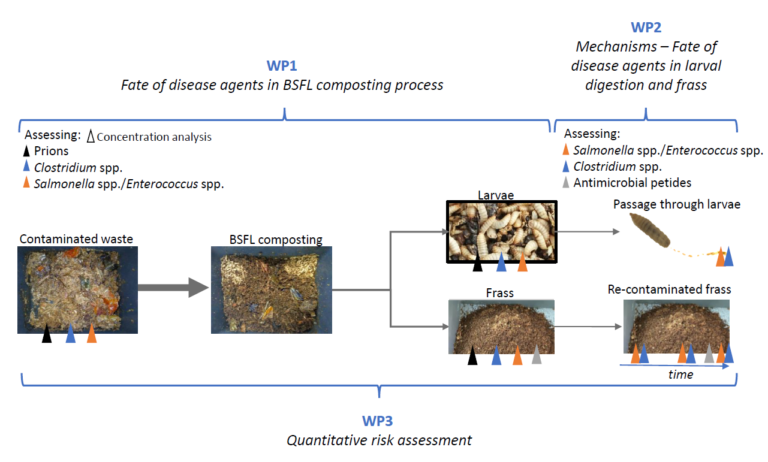We are very happy to announce that Formas has decided to fund our project Circular economy in feed production by fly larvae composting – risks of accumulation of persistent disease agents in the reuse chain. In this project we will dive back into the hygiene of the black soldier fly larvae composting process, investigating the fate persistent disease agents we have so far not been able to able to study, e.g. scrapie prions and spore-forming bacteria.
We will investigate what happens to disease agents in the BSFL composting process and verify whether they end up in the larvae, the frass or are destroyed/inactivated. We will also try to establish if the known inactivation of selected disease agents (e.g. Salmonella spp.) happens in the passage through the larvae or is due to excretion of antimicrobial peptides. Finally, we will wrap up all collected knowledge in a quantitative risk assessment, in which we focus in particular at the risk of prions. The lack of knowledge to what happens to prions in this process we believe is one major reason that hinders the use of post-consumer food waste as feed substrate to insects.

To increase our joy even more, we were also granted another Formas project, in collaboration with Ecoloop, RagnSells, Tebrito, Johannas stadsodlingar. The aim of the project is to link the lab scale knowledge of the hygiene in insect processing to larger scale settings. We will develop quality control measures and implemented them at commercial facilities in proof-of-concept studies. In addition, the use of a block-chain based digital traceability system in a circular food production chain in which food waste is used as insect substrate will be investigated and a conceptual model designed. Discussions with authorities and certification organs will be maintained throughout the project. Hopefully these two projects can be part of a process in which the regulation on substrates for insects to include real waste substrates and not only food industry waste streams that are currently allowed. Many insect researchers are in agreement: for insects to have a real and sustainable impact on our food systems, they have to be reared on real waste substrates (see excellent comment on the Principles for the responsible use of farmed insects as livestock feed in nature food by Parodi et al (2022)).


 For further information, get in touch with Luis at the Department of Energy and Technology, P.O. Box 7032, SE-750 07 Uppsala, Sweden. E-mail: fernando.perez@slu.se
For further information, get in touch with Luis at the Department of Energy and Technology, P.O. Box 7032, SE-750 07 Uppsala, Sweden. E-mail: fernando.perez@slu.se For further information, get in touch with Jenna Senecal at the Department of Energy and Technology, P.O. Box 7032, SE-750 07 Uppsala, Sweden. E-mail:
For further information, get in touch with Jenna Senecal at the Department of Energy and Technology, P.O. Box 7032, SE-750 07 Uppsala, Sweden. E-mail: